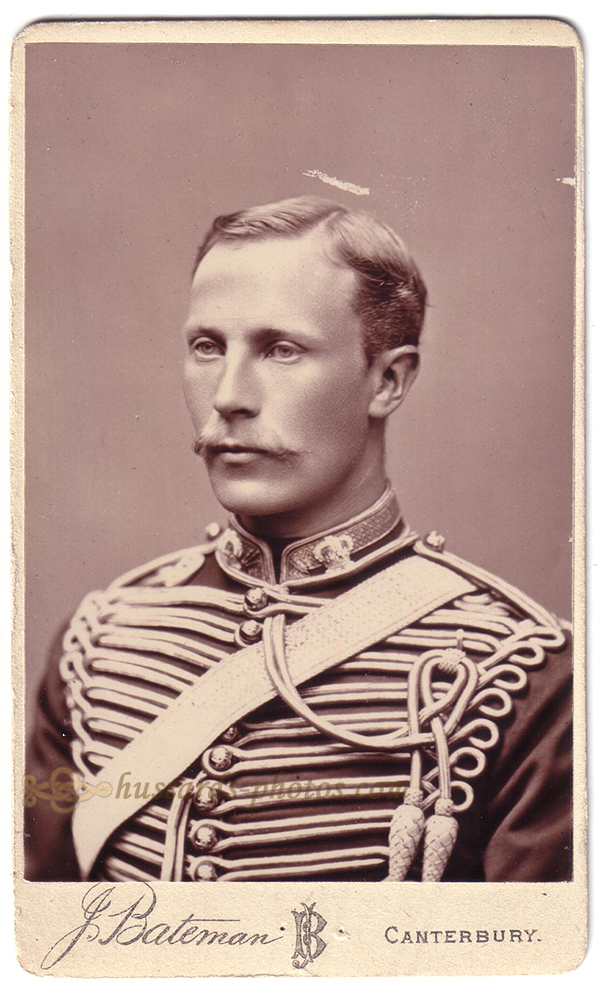| Philip Saltmarshe was born on June 9th,
1853 in Howden, East Riding of Yorkshire. He was the son of
Lieutenant-Colonel Philip Saltmarshe ; the family lived in
Saltmarshe Hall. Lieutenant-colonel was Lord of the Manor,
and the family is said to have been there since the time of the
Normans - Sir Lionel Saltmarshe having been knighted by William
the Conqueror at the Castle of Knore on november 14th, 1067, where
he was given the Lordship of Saltmarshe under Royal Letters
Patent.
Our sitter followed track in the military
career.
After beng educated at Eton (1867-69) he joined the Royal Military
Academy, Woolwich and entered the Army in 1872.
He became a Lieutenant in the Royal Artillery on January
9th, 1873.
In 1875 he was attached to the 16th Brigade.
He took part in the Second Afghan War in
1878-79 (Medal) with No. 5 (Heavy) Battery of the 11th Brigade,
from the commencement of the war until April 1879, and then from
that date until August 1879 as Commissary of Ordnance at Kandahar.
5/11 were part of Stewart's column to Kandahar, reaching their
destination in Jan 1879 (3 40-pounders with elephants, 3 8-inch
mortars). The battery returned to Quetta in August 1879.
In 1880 he was attached to C Brigade, Royal Horse Artillery.
We learn that Lieutenant Saltmarshe, RHA,
had embarked on 22 March 1881 with Lieutenant H.C.Slater, RHA, on
board the National steamer Holland (Captain Brownlow) at the
Albert Docks, North Woolwich, when a telegram was received,
directing that the departure of the ship should be delayed. The
ship was to take 150 horses and nearly 400 men to the Transvaal.
However the final peace treaty was to be signed on March 23. The
rest of E Battery, C Brigade, RHA, Major
Borradaile, had left on board the Persian Monarch a fortnight
before, and will be ordered back to England.
Philip Saltmarshe will be promoted to
Captain on January 10, 1882, and transferred a mere few month
before his former Battery was to see some action in Egypt.
In 1883, he married Ethel, the daughter
of Charles Murray Adamson of North Jesmond, Newcastle-on-Tyne.
His wife gave birth to a daughter on June
15th 1885, at 3, Cyprus-villas, Aldershott.
He will
be promoted to Major
on October 1st, 1889. In July 1890 he was selected as the Unionist
candidate for the Howdenshire division of Yorkshire, but he will
retire from that position in September inst.
Bulmer's Directory of 1892 tell us that
Major Philip Saltmarshe, RHA, is a "Magistrate for
Howdenshire - Petty Seasonnal Division" (of which his father
is the chairman). In 1890 he had been selected as the Unionist
candidate for the Howdenshire Division of Yorkshire, but
eventually retired from the candidacy.
In 1893 he is listed as posted in the RGA
(Royal Garrison Artillery), the Major for Portsmouth Station. On
October14th 1898 he is promoted to Lieutenant-Colonel (dated
October 6th).
He wrote an article titled "Competitive Practice in the
Garrison Artillery and its Effect on the training of Officers and
Men", published in the "Proceedings of the Royal
Artillery Institution" c. 1896.
In the Boer War he commanded the heavy
artillery of the Natal Field Force.
The London Times of February 5th, 1900
indicate that Lieutenant-Colonel Saltmarshe boarded the
Dominion liner Canada at Southampton on February 4th, on his way to South
Africa.
This specific stay will not be an extended one as
the London Times of july 13th, 1900, states that the Nubia left
Cape Town on July 4th with invalids - the list including Lieutenant-Colonel Saltmarshe, RGA. He reached Southampton on
July
26th.
For his War Service in South Africa, he received the Queen's War
Medal with three Clasps.
He was promoted to Colonel on October
6th, 1902. In June 1903, we learn that Colonel Saltmarshe, RGA, is
the Fire Commander of the Thames defence section.
The October 13th, 1903 London Gazette states at last :
"Royal Garrison Artillery, Brevet Colonel Philip
Saltmarshe, on completion of five years' service as a regimental
Lieutenant-Colonel, is placed on retired pay. Dated 6th October,
1903."
He wrote an article titled "Defence
against torpedo-boat raids", published in the "Proceedings
of the Royal Artillery Institution, July August and September
1903".
Colonel Philip Saltmarshe, JP, DL, who had a keen
interest in history and archeology, died on March
15th, 1941, at the age of 87. The Times tells us he left £270,371,
including settled land (net personalty £225,111).
Many thanks to Garen
Ewing for his help
|

